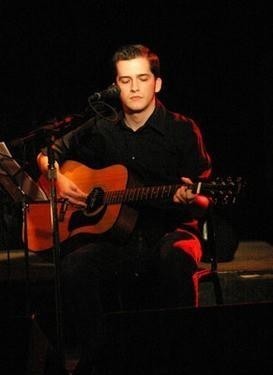 Sons of Perdition is a band from Austin, Texas (originally from Denton, Texas now relocated to Glasgow, UK), see website. Sons of Perdition should not be confused with The Sons of Perdition (a generic metal band from Germany). This article refers to Artist ID P 1040261 on ALL MUSIC GUIDE. All Music Guide have, btw, for some reason mixed them up. The music, lyrics and the albums covers differ greatly so there's really no risk of any confusion. The current lineup consists of Zebulon Whatley (words and sounds), Simon Broke (double bass) and Eli Rose (sounds and words). Sons of Perdition are now in what you can call a long-distance relationship. For over 10 years frontfigure Zebulon Whatley was the only and very self-reliant member and therefore there's a strong focus on him and his earlier works in this article. Sons of Perdition started in 2002 as a side-project of a band. The side-project eventually outgrew the band and became the main project for Zebulon Whatley. In a radio interview for Austin Artists show on KAOS Radio in Austin Zebulon Whatley revelead the basic idea behind the band: "a pretty warped framework of morality and see how far I could push it before it completely crumbled under the stress". In my opinon, that's a very odd mission statement for a band in any genre. In the radio interview Zebulon Whatley develops this further: "Initially, I had this idea for starting a band and over the course of three albums turning it from a very, very strict religious band and completely inverting the allegory and showing the exact opposite, which should be a very evil band and see if anybody noticed”. "Sons of Perdition" makes you imagine a couple of hardline "goths", ragged clothes and unbridled tattoes. But Sons of Perdition was started by one person only, Zebulon Whatley, who also has a very tended appearance. The same is true for the band. In an e-mail Zebulon Whatley explains how he come up with the band name "Sons of Perdition": "Well, it’s a biblical phrase describing those few who are beyond salvation. They’re irredeemable. According to the Bible, even Jesus is powerless to save them, which is a hell of an accomplishment. I thought it was a perfectly morose name for gospel band, which was the original direction for the band." The concept Sons of Perdition mentioned in John 17:12 "While I was with them, I was keeping them in Your name which You have given Me; and I guarded them and not one of them perished but the son of perdition, so that the Scripture would be fulfilled" and Thessalonians 2:3 "Let no man deceive you by any means: for that day shall not come, except there come a falling away first, and that man of sin be revealed, the son of perdition".
Sons of Perdition is a band from Austin, Texas (originally from Denton, Texas now relocated to Glasgow, UK), see website. Sons of Perdition should not be confused with The Sons of Perdition (a generic metal band from Germany). This article refers to Artist ID P 1040261 on ALL MUSIC GUIDE. All Music Guide have, btw, for some reason mixed them up. The music, lyrics and the albums covers differ greatly so there's really no risk of any confusion. The current lineup consists of Zebulon Whatley (words and sounds), Simon Broke (double bass) and Eli Rose (sounds and words). Sons of Perdition are now in what you can call a long-distance relationship. For over 10 years frontfigure Zebulon Whatley was the only and very self-reliant member and therefore there's a strong focus on him and his earlier works in this article. Sons of Perdition started in 2002 as a side-project of a band. The side-project eventually outgrew the band and became the main project for Zebulon Whatley. In a radio interview for Austin Artists show on KAOS Radio in Austin Zebulon Whatley revelead the basic idea behind the band: "a pretty warped framework of morality and see how far I could push it before it completely crumbled under the stress". In my opinon, that's a very odd mission statement for a band in any genre. In the radio interview Zebulon Whatley develops this further: "Initially, I had this idea for starting a band and over the course of three albums turning it from a very, very strict religious band and completely inverting the allegory and showing the exact opposite, which should be a very evil band and see if anybody noticed”. "Sons of Perdition" makes you imagine a couple of hardline "goths", ragged clothes and unbridled tattoes. But Sons of Perdition was started by one person only, Zebulon Whatley, who also has a very tended appearance. The same is true for the band. In an e-mail Zebulon Whatley explains how he come up with the band name "Sons of Perdition": "Well, it’s a biblical phrase describing those few who are beyond salvation. They’re irredeemable. According to the Bible, even Jesus is powerless to save them, which is a hell of an accomplishment. I thought it was a perfectly morose name for gospel band, which was the original direction for the band." The concept Sons of Perdition mentioned in John 17:12 "While I was with them, I was keeping them in Your name which You have given Me; and I guarded them and not one of them perished but the son of perdition, so that the Scripture would be fulfilled" and Thessalonians 2:3 "Let no man deceive you by any means: for that day shall not come, except there come a falling away first, and that man of sin be revealed, the son of perdition".
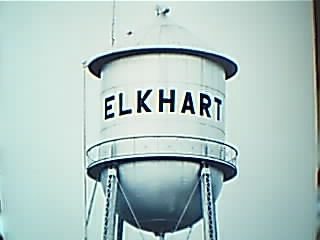 Zebulon Whatley is a very private person and even the name is a pseudonym. However, the origin of the pseudonym is a matter of dispute. One school argues that it’s composed of the first name of the military Zebulon Montgomery Pike and the last name of sheriff Willis Whatley (both lived during the first half of the 19th century), while a competing school argues that Zebulon Whatley refers to the character Zebulon Whateley (another spelling) that appears in a couple of H.P. Lovecraft's short stories. You can read about the dispute here (opens in a new window). Zebulon Whatley has been very successful in protecting his privacy. He talks freely about his creative process and things that influence his music. In contrast, he speaks not so much about himself. In an interview on his website Zebulon Whatley reveals: "I grew up in a very rural area of East Texas, about twenty minutes outside the town of Elkhart (population 1,076). It absolutely influenced my songwriting. The religious zealotry, extreme Christian logic, spiritual decay, abject poverty... these were all things that I could witness by looking out of my front door. They all stuck with me, too." Religion was omnipresent for Zebulon Whatley. In the interview he explains: "I find it easiest to write what I know about. Religion is king where I grew up... I'm never left without source material." For a couple of years Zebulon Whatley was a devout member of a grim, no-nonsense fire-and-brimstone congregation. In interviews Zebulon Whatley have stated that he has chosen to turn this experience into something positive and letting this inform his creative work. The personal facts are scarce. In an interview for the readable website Swamplandzine (whose motto is "A creative sanctuary for those who refuse to give in to the devils of convention") he reveals that: "I'm an art school dropout that always had a penchant for the melancholy and a taste for weird tales. This, coupled with my musical taste, resulted in the band which is a culmination of my likes. It's about as true of a representation of my aesthetic leanings as I figure there ever has been." He had earlier an ambition to become a beat poet (which is very far from his later trade marks). Zebulon Whatley started playing music when he was about 15 years old. He is among other things fascinated of books of science and pseudoscience and also interested in religion, mythology and human behavior. That's about everything I have managed to find out.
Zebulon Whatley is a very private person and even the name is a pseudonym. However, the origin of the pseudonym is a matter of dispute. One school argues that it’s composed of the first name of the military Zebulon Montgomery Pike and the last name of sheriff Willis Whatley (both lived during the first half of the 19th century), while a competing school argues that Zebulon Whatley refers to the character Zebulon Whateley (another spelling) that appears in a couple of H.P. Lovecraft's short stories. You can read about the dispute here (opens in a new window). Zebulon Whatley has been very successful in protecting his privacy. He talks freely about his creative process and things that influence his music. In contrast, he speaks not so much about himself. In an interview on his website Zebulon Whatley reveals: "I grew up in a very rural area of East Texas, about twenty minutes outside the town of Elkhart (population 1,076). It absolutely influenced my songwriting. The religious zealotry, extreme Christian logic, spiritual decay, abject poverty... these were all things that I could witness by looking out of my front door. They all stuck with me, too." Religion was omnipresent for Zebulon Whatley. In the interview he explains: "I find it easiest to write what I know about. Religion is king where I grew up... I'm never left without source material." For a couple of years Zebulon Whatley was a devout member of a grim, no-nonsense fire-and-brimstone congregation. In interviews Zebulon Whatley have stated that he has chosen to turn this experience into something positive and letting this inform his creative work. The personal facts are scarce. In an interview for the readable website Swamplandzine (whose motto is "A creative sanctuary for those who refuse to give in to the devils of convention") he reveals that: "I'm an art school dropout that always had a penchant for the melancholy and a taste for weird tales. This, coupled with my musical taste, resulted in the band which is a culmination of my likes. It's about as true of a representation of my aesthetic leanings as I figure there ever has been." He had earlier an ambition to become a beat poet (which is very far from his later trade marks). Zebulon Whatley started playing music when he was about 15 years old. He is among other things fascinated of books of science and pseudoscience and also interested in religion, mythology and human behavior. That's about everything I have managed to find out.
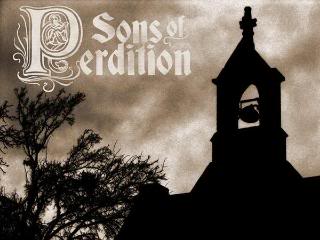 As in the case of Those Poor Bastards (Lonesome Wyatt and the Holy Spooks) a caveat is in place. On Zebulon Whatley's Facebook page (now shut down), it's declared: "I make songs that shouldn't be heard". But if you're just the least interested in "gothic country" then Sons of Perdition is an obvious artist to immerse in. However, Zebulon Whatley is reluctant to use labels in general and becoming a spokesman for the "gothic country" genre in particular (more on this subject below). In my work for the site I have come to realize that labeling is a matter of conflict of interest. I have an interest of labeling artists and genres as general consumer guidance. And someone (that's me) has to take on the mission and try to bring some order in this unmanageable mess. On the other hand, artists and bands often dislikes labels (of course, by its very nature it's a simplification and doesn't capture the whole and true complex). In fact, it's often the fake and non-authentic artists and bands that embrace labels. Sometimes they label themselves (moreover wrongly and undeservingly), which is an abomination. With that being said, let's get on with the labelmaking. There are several similarities between Those Poor Bastards (Lonesome Wyatt) and Sons of Perdition (Zebulon Whatley). They have both grown up in desolate rural areas, they are both active in the subgenre "doom country" or "death country". Lonesome Wyatt contributes with backing vocal on Sons of Perditions two first albums (on the songs Blood in the Valley and Psalm of Nod) and there is also other collaboration between them. For example Zebulon Whatley plays banjo, bass, slide guitar and contributes with backing vocals on "Born to Preach" on Those Poor Bastards album "Vicious Losers". But while TPB is working with expressive, not to say, bombastic means, Sons of Perdition is working very restrained and minimalistic. However, this applies only to the music, not the lyrics. Sons of Perdition is at least as fascinating and terrifying as Those Poor Bastards, if not more. The lyrics are just as explicit as Those Poor Bastards. If you want to make a distinction between them, then Those Poor Bastards can be labeled (evil doom/death country) and Sons of Perdition can be labeled (apocalyptic doom/death country). Sons of Perdition are sometimes labeled "gothic western". There are also some similarities with Slackeye Slim (western-thematic doom/death country). Needless to say, both Sons of Perdition and Slackeye Slim master the western gothic sound to the fullest.
As in the case of Those Poor Bastards (Lonesome Wyatt and the Holy Spooks) a caveat is in place. On Zebulon Whatley's Facebook page (now shut down), it's declared: "I make songs that shouldn't be heard". But if you're just the least interested in "gothic country" then Sons of Perdition is an obvious artist to immerse in. However, Zebulon Whatley is reluctant to use labels in general and becoming a spokesman for the "gothic country" genre in particular (more on this subject below). In my work for the site I have come to realize that labeling is a matter of conflict of interest. I have an interest of labeling artists and genres as general consumer guidance. And someone (that's me) has to take on the mission and try to bring some order in this unmanageable mess. On the other hand, artists and bands often dislikes labels (of course, by its very nature it's a simplification and doesn't capture the whole and true complex). In fact, it's often the fake and non-authentic artists and bands that embrace labels. Sometimes they label themselves (moreover wrongly and undeservingly), which is an abomination. With that being said, let's get on with the labelmaking. There are several similarities between Those Poor Bastards (Lonesome Wyatt) and Sons of Perdition (Zebulon Whatley). They have both grown up in desolate rural areas, they are both active in the subgenre "doom country" or "death country". Lonesome Wyatt contributes with backing vocal on Sons of Perditions two first albums (on the songs Blood in the Valley and Psalm of Nod) and there is also other collaboration between them. For example Zebulon Whatley plays banjo, bass, slide guitar and contributes with backing vocals on "Born to Preach" on Those Poor Bastards album "Vicious Losers". But while TPB is working with expressive, not to say, bombastic means, Sons of Perdition is working very restrained and minimalistic. However, this applies only to the music, not the lyrics. Sons of Perdition is at least as fascinating and terrifying as Those Poor Bastards, if not more. The lyrics are just as explicit as Those Poor Bastards. If you want to make a distinction between them, then Those Poor Bastards can be labeled (evil doom/death country) and Sons of Perdition can be labeled (apocalyptic doom/death country). Sons of Perdition are sometimes labeled "gothic western". There are also some similarities with Slackeye Slim (western-thematic doom/death country). Needless to say, both Sons of Perdition and Slackeye Slim master the western gothic sound to the fullest.
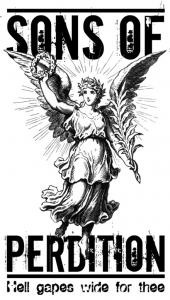 In the email Zebulon Whatley describes how his songwriting process looks like: "I don’t have a set writing process. It changes from album to album, and song to song. For my first album, The Kingdom is on Fire, I came up with an idea for a song, made up the basic music, wrote the lyrics, and then improvised most of the music during the recording process. For the album Psalms for the Spiritually Dead, I had an overall album concept at the beginning. Then, if memory serves, I wrote the lyrics and then made up the music as I was recording. With the album Trinity, I had a concept for the album, which I outlined and reworked for a couple of years before I started writing any songs. I did a lot of research and reading for that one. I wrote the lyrics before the music (with a couple of exceptions). Then I rewrote and rewrote the lyrics through endless cycles of editing." In the email Zebulon Watley also develops his views on the creative process when it comes to finding themes, moods and expressions: "Like everything else, it varies. While I’m usually oblivious at the time, after I look back on songs I’ve written, I can usually pick out scraps of books, movies, music, and road trips I experienced around the time of writing. In that way, they’re a bit like reading a journal through the wrong end of a telescope. Usually once I settle on an idea, I won’t write anything down. I’ll think about it for weeks or months, turning the idea over in my head and looking at it from all angles. Eventually, I’ll get seized by the impulse to write it down, usually in one sitting." The songs are very simple constructed, with guitar, slide guitar, bass, and sometimes strings. The music is often very slow where different moods are built up in a nice interplay between vocals and accompaniment. The lyrics are dark and sometimes quite morbid. Sometimes extreme as in the song Fall To Your Knees: ”When your spirit's surrendered and forsaken your flesh and you wander the earth with no comfort or rest, don't go searching for solace for you cannot be saved when your soul lies and festers in the mouth of the grave.” Zebulon Whatley has a very developed linguistic instinct and furthermore a very rich vocabulary. In my opinion, the thing that makes Sons of Perdition so interesting is the depth, diversity and ambiguity in the music. He consciously leave his lyrics open to interpretation. There’s always a different angle, another layer or multiple meanings to explore for you as a listener. These properties mean that it never becomes weary. The songs comprises of eschatological stories, cautionary tales, urban legends which with a steel ruler emphasizes the moral, really nasty murder ballads and stories based on real events.
In the email Zebulon Whatley describes how his songwriting process looks like: "I don’t have a set writing process. It changes from album to album, and song to song. For my first album, The Kingdom is on Fire, I came up with an idea for a song, made up the basic music, wrote the lyrics, and then improvised most of the music during the recording process. For the album Psalms for the Spiritually Dead, I had an overall album concept at the beginning. Then, if memory serves, I wrote the lyrics and then made up the music as I was recording. With the album Trinity, I had a concept for the album, which I outlined and reworked for a couple of years before I started writing any songs. I did a lot of research and reading for that one. I wrote the lyrics before the music (with a couple of exceptions). Then I rewrote and rewrote the lyrics through endless cycles of editing." In the email Zebulon Watley also develops his views on the creative process when it comes to finding themes, moods and expressions: "Like everything else, it varies. While I’m usually oblivious at the time, after I look back on songs I’ve written, I can usually pick out scraps of books, movies, music, and road trips I experienced around the time of writing. In that way, they’re a bit like reading a journal through the wrong end of a telescope. Usually once I settle on an idea, I won’t write anything down. I’ll think about it for weeks or months, turning the idea over in my head and looking at it from all angles. Eventually, I’ll get seized by the impulse to write it down, usually in one sitting." The songs are very simple constructed, with guitar, slide guitar, bass, and sometimes strings. The music is often very slow where different moods are built up in a nice interplay between vocals and accompaniment. The lyrics are dark and sometimes quite morbid. Sometimes extreme as in the song Fall To Your Knees: ”When your spirit's surrendered and forsaken your flesh and you wander the earth with no comfort or rest, don't go searching for solace for you cannot be saved when your soul lies and festers in the mouth of the grave.” Zebulon Whatley has a very developed linguistic instinct and furthermore a very rich vocabulary. In my opinion, the thing that makes Sons of Perdition so interesting is the depth, diversity and ambiguity in the music. He consciously leave his lyrics open to interpretation. There’s always a different angle, another layer or multiple meanings to explore for you as a listener. These properties mean that it never becomes weary. The songs comprises of eschatological stories, cautionary tales, urban legends which with a steel ruler emphasizes the moral, really nasty murder ballads and stories based on real events.
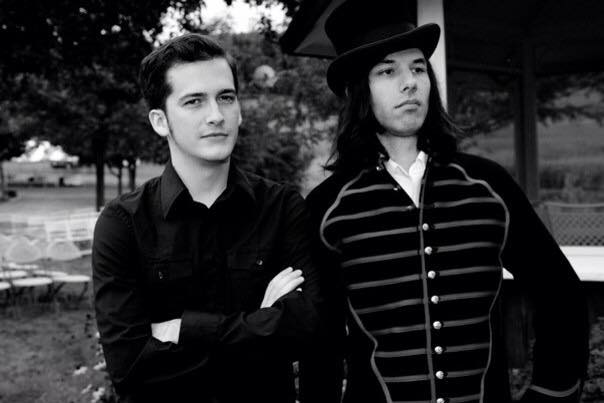 The references to the Bible are always present: "Hell Gapes Wide for Thee". Some songs have elements of spoken-word in them. In the email Zebulon Whatley describes the background for the, to say the least, spectacular sermon “Satan is among us tonight friends…" on the song “Blood in the Valley”: “When I was growing up, the AM radio stations in East Texas played a lot of hellfire-and-brimstone sermons. Hell, they probably still do. When I started working on The Kingdom is on Fire, I wanted the songs to fade in and out between radio static and these horrid sermons and church hymns (including an a cappella version of “All He Wants (Is My Blood)” that I recorded). I eventually talked myself out of the idea because I didn’t want the album to be too pretentious, but I kept bits of the concept. Part of the original sermon that I recorded for the overall album later found its way onto “Psalm 138”. I had recently discovered Those Poor Bastards, so I gave Lonesome Wyatt carte blanche to record a hellish sermon for the song. What’s on there is all him, so I can’t take credit for it. I think he did a bang-up job.” I couldn’t agree more. Another example is the equally fascinating and disturbing sequence on “Psalm of Slumber” (the pleas of the damned and doomed), which are excerpts from the “Jonestown death tapes” in 1978. In the email Zebulon Whatley explains the background: “Psalm of Slumber” is populated by the ghosts of Jonestown. The samples are all pulled from the death tape of the Jonestown Massacre, where Reverend Jim Jones convinced (or coerced) over nine hundred members of his Peoples Temple to commit suicide. The incident (and to a lesser extent, the song) serves as a warning about blindly following a leader, whether religious or political. I spent hours scrubbing out the sounds of children screaming and dying because I didn’t want to be exploitative. Besides, the song is more about the shepherd than the flock.” I didn’t know the background of this sequence on the song, until Zebulon Whatley revealed it. However, I always thought this part was very scary and unsettling. Maybe it’s the authenticity. Now, when I know the background, it’s even more so. You can read the transcription here (opens in a new window).
The references to the Bible are always present: "Hell Gapes Wide for Thee". Some songs have elements of spoken-word in them. In the email Zebulon Whatley describes the background for the, to say the least, spectacular sermon “Satan is among us tonight friends…" on the song “Blood in the Valley”: “When I was growing up, the AM radio stations in East Texas played a lot of hellfire-and-brimstone sermons. Hell, they probably still do. When I started working on The Kingdom is on Fire, I wanted the songs to fade in and out between radio static and these horrid sermons and church hymns (including an a cappella version of “All He Wants (Is My Blood)” that I recorded). I eventually talked myself out of the idea because I didn’t want the album to be too pretentious, but I kept bits of the concept. Part of the original sermon that I recorded for the overall album later found its way onto “Psalm 138”. I had recently discovered Those Poor Bastards, so I gave Lonesome Wyatt carte blanche to record a hellish sermon for the song. What’s on there is all him, so I can’t take credit for it. I think he did a bang-up job.” I couldn’t agree more. Another example is the equally fascinating and disturbing sequence on “Psalm of Slumber” (the pleas of the damned and doomed), which are excerpts from the “Jonestown death tapes” in 1978. In the email Zebulon Whatley explains the background: “Psalm of Slumber” is populated by the ghosts of Jonestown. The samples are all pulled from the death tape of the Jonestown Massacre, where Reverend Jim Jones convinced (or coerced) over nine hundred members of his Peoples Temple to commit suicide. The incident (and to a lesser extent, the song) serves as a warning about blindly following a leader, whether religious or political. I spent hours scrubbing out the sounds of children screaming and dying because I didn’t want to be exploitative. Besides, the song is more about the shepherd than the flock.” I didn’t know the background of this sequence on the song, until Zebulon Whatley revealed it. However, I always thought this part was very scary and unsettling. Maybe it’s the authenticity. Now, when I know the background, it’s even more so. You can read the transcription here (opens in a new window).
 Zebulon Whatley has very dark, balanced and well-modulated voice. The music coming from Sons of Perdition is beautiful. Sometimes you forget that he makes almost everything by himself. The production has evolved over time from quite simple to more sophisticated arrangements. Zebulon Whatley works with home recording. In the email Zebulon Whatley describes how this has evolved over time: “I cobbled together a recording system early on and have swapped out equipment, hardware, and software piecemeal since. I’ve gotten to the point where the recording process is pretty transparent for me. I don’t have to troubleshoot equipment for an hour just to lay down an idea. Also, I’m able to get a pretty clean signal now since most of the stuff is digital, which saves a lot of time when it comes to post-production. My main motivation for recording at home is financial, or at least it was to begin with. Studio time is expensive. What I’ve learned, though, is that there’s a real sense of freedom to be found in recording at home. You’re allowed to make endless mistakes until you get it right. There are no deadlines, and you don’t have to keep an eye on the clock, which frees you up to experiment. I’ve tried to be as self-sufficient as possible when it comes to the band. By recording at home, mastering the songs (which I’m experimenting with now), creating the artwork, and distributing online, my expenses are next to nothing. That means I don’t have to budget and endlessly plan when the idea for an album strikes me. I can work at my own pace and release stuff whenever I feel like it.” In the radio interview for Austin Artists show Zebulon Whatley declared that he is not a very proficient musician and that he could record and re-record a song 30-50 times before he is satisfied with the result. To this should be added the work on the lyrics with much writing and re-writing. Zebulon Whatley spent three years working on his first album, spent (for me) unknown years on his second album and five years on his third and latest album. Whatever musical preferences you have, you have to admire the commitment and endurance when it comes to develop and pursue the ideas. And making music "it's cheaper than therapy" as Zebulon Whatley point out in the interview.
Zebulon Whatley has very dark, balanced and well-modulated voice. The music coming from Sons of Perdition is beautiful. Sometimes you forget that he makes almost everything by himself. The production has evolved over time from quite simple to more sophisticated arrangements. Zebulon Whatley works with home recording. In the email Zebulon Whatley describes how this has evolved over time: “I cobbled together a recording system early on and have swapped out equipment, hardware, and software piecemeal since. I’ve gotten to the point where the recording process is pretty transparent for me. I don’t have to troubleshoot equipment for an hour just to lay down an idea. Also, I’m able to get a pretty clean signal now since most of the stuff is digital, which saves a lot of time when it comes to post-production. My main motivation for recording at home is financial, or at least it was to begin with. Studio time is expensive. What I’ve learned, though, is that there’s a real sense of freedom to be found in recording at home. You’re allowed to make endless mistakes until you get it right. There are no deadlines, and you don’t have to keep an eye on the clock, which frees you up to experiment. I’ve tried to be as self-sufficient as possible when it comes to the band. By recording at home, mastering the songs (which I’m experimenting with now), creating the artwork, and distributing online, my expenses are next to nothing. That means I don’t have to budget and endlessly plan when the idea for an album strikes me. I can work at my own pace and release stuff whenever I feel like it.” In the radio interview for Austin Artists show Zebulon Whatley declared that he is not a very proficient musician and that he could record and re-record a song 30-50 times before he is satisfied with the result. To this should be added the work on the lyrics with much writing and re-writing. Zebulon Whatley spent three years working on his first album, spent (for me) unknown years on his second album and five years on his third and latest album. Whatever musical preferences you have, you have to admire the commitment and endurance when it comes to develop and pursue the ideas. And making music "it's cheaper than therapy" as Zebulon Whatley point out in the interview.
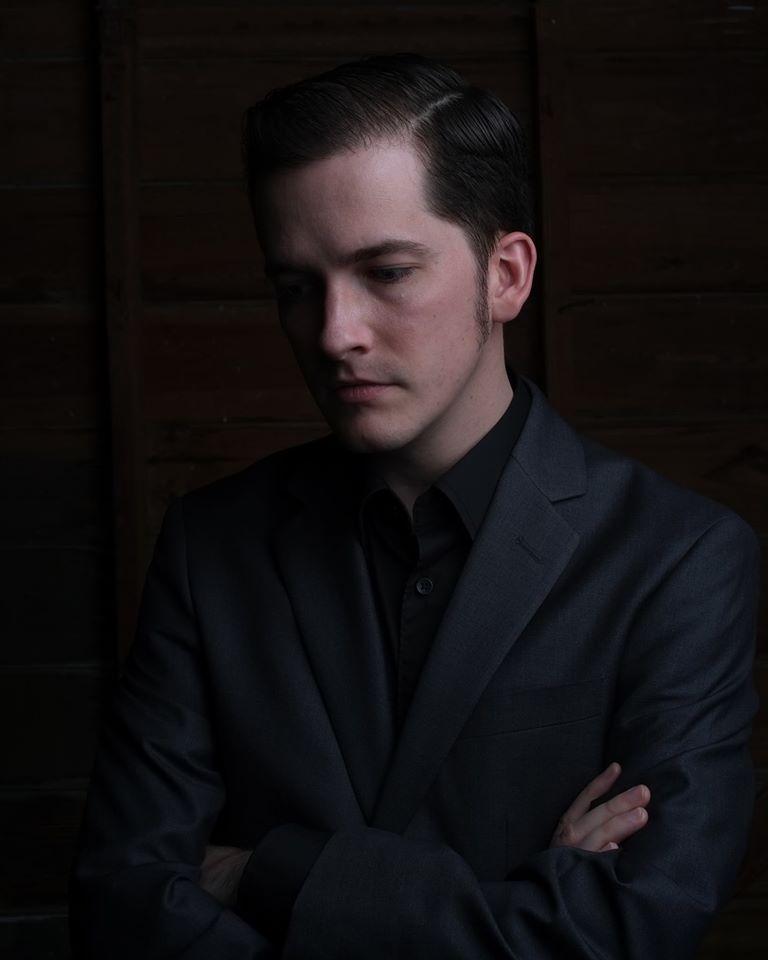 It may be appropriate to stop for a while and reconnect to the earlier subject of labels and the “gothic country” genre. In the email, Zebulon Whatley develops his view on the future for musicians/bands in the “gothic country” vein: “Honestly, I have neither a clue nor a deep and abetting interest. I’ve never kept up on the genre, not even in the beginning. The way I see it, as a songwriter I shouldn’t listen to music that’s comparable to mine. It will just lead to my own music stagnating by either mimicking or deliberately avoiding what’s going on in the genre. Occasionally I’ll look up a song that a friend recommends and I think some of it is interesting. I just hope it doesn’t devolve to the point of being a constrictive thing, where the bands think they can only write about certain things and have to sound a certain way, and where it becomes a fashion trend for the fans. When people set out to strictly define things, creativity withers and rots on the vine. This happens to every genre of music, usually when people figure out that it can be commercialized easier if things are codified. When I started Sons of Perdition, I was unaware that “gothic country” existed. I liked Nick Cave, Marty Robbins, and Danzig so I decided to start work on an album that I would be interested in. It wasn’t because I wanted to contribute to “the scene” or anything like that. As far as labels go, people need a hook on which to hang their music, so I’m not remotely offended that Sons of Perdition has been labeled a “gothic country” band. It’s convenient and it’s a descriptive term, even to people who have never heard any bands in the genre. That being said, a lot of the stuff I’ve worked on (like "Psalm of Slumber” and “Fallout") is wholly without country influence, so it’s a bit of a misnomer at times. I’m aware that the term exists, but I don’t pay it any mind when I’m working on music. I think these kind of labels should be applied post-mortem and should never influence the creative process going in because they’re stifling. I don’t believe that anyone should set out to make a “gothic country” album. If it happens, it happens. I’ll just continue working on what interests me and people can call it whatever the hell they want.”
It may be appropriate to stop for a while and reconnect to the earlier subject of labels and the “gothic country” genre. In the email, Zebulon Whatley develops his view on the future for musicians/bands in the “gothic country” vein: “Honestly, I have neither a clue nor a deep and abetting interest. I’ve never kept up on the genre, not even in the beginning. The way I see it, as a songwriter I shouldn’t listen to music that’s comparable to mine. It will just lead to my own music stagnating by either mimicking or deliberately avoiding what’s going on in the genre. Occasionally I’ll look up a song that a friend recommends and I think some of it is interesting. I just hope it doesn’t devolve to the point of being a constrictive thing, where the bands think they can only write about certain things and have to sound a certain way, and where it becomes a fashion trend for the fans. When people set out to strictly define things, creativity withers and rots on the vine. This happens to every genre of music, usually when people figure out that it can be commercialized easier if things are codified. When I started Sons of Perdition, I was unaware that “gothic country” existed. I liked Nick Cave, Marty Robbins, and Danzig so I decided to start work on an album that I would be interested in. It wasn’t because I wanted to contribute to “the scene” or anything like that. As far as labels go, people need a hook on which to hang their music, so I’m not remotely offended that Sons of Perdition has been labeled a “gothic country” band. It’s convenient and it’s a descriptive term, even to people who have never heard any bands in the genre. That being said, a lot of the stuff I’ve worked on (like "Psalm of Slumber” and “Fallout") is wholly without country influence, so it’s a bit of a misnomer at times. I’m aware that the term exists, but I don’t pay it any mind when I’m working on music. I think these kind of labels should be applied post-mortem and should never influence the creative process going in because they’re stifling. I don’t believe that anyone should set out to make a “gothic country” album. If it happens, it happens. I’ll just continue working on what interests me and people can call it whatever the hell they want.”
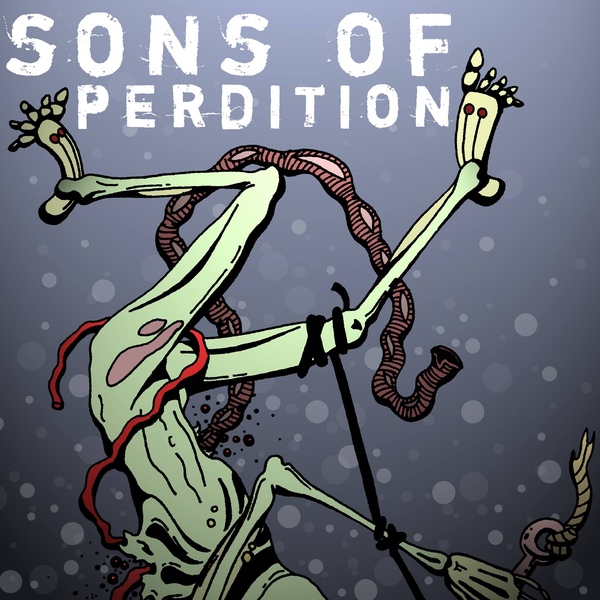 Let us now go over to the exquisite production. Sons of Perdition has made four albums "The Kingdom is on Fire" (2007), "Psalms for the Spiritually Dead" (2010), "Trinity" (2013), "Gathered Blood" (2016), "Heathen Hof" (2022) and a split album with Jaran Hereid "Fossils" (2015). The three first mentioned albums constitute "The Dissolution Trilogy". Of course, I was curious about the background and asked if there was a clear and coherent idea of a trilogy with distinct themes and moods for each album or if this was something that evolved over time. In the email Zebulon Watley writes: "Yes and no. I had a basic idea of what I wanted to do with the band over the course of three albums, but no specifics. The Kingdom is on Fire is more of a collection of songs than a cohesive album (or at least a concept album). It wasn’t until I started work on Psalms for the Spiritually Dead that I looked back on the first album and recognized the concept running through most of the songs. It was at this same time that I started kicking around ideas for this three-album arc, although these ideas changed drastically by the time I got around to writing Trinity and wrapping up the Dissolution Trilogy." The overall theme for TKIOF is physical death. “The Kingdom is on Fire” is mainly an acoustic album and could be regarded as Sons of Perditions “country” album (in the sense most country-like album). There’s no consistent theme (more than physical death), just a collection of narrative songs. The theme for PFTSD is spiritual death. On the second album "Psalms for the Spiritually Dead" the country-sound was replaced by extreme and overly slow, not to say, tedious blues-based and dark hymns. Zebulon Whatley’s idea for the sound on this album was “overwhelmingly bleak”. Listen and lament but never repent. Electrical instruments and effects are used on the album. Like TKIOF there’s no consistent theme for the album (more than spiritual death), just dark narrative songs. PFTSD is only released digitally. On the website there is an explanation: "Psalms" is only available as MP3 for the foreseeable future. This will change, of course, when someone heaps enough cash on me to allow me to have records made.” It is incomprehensible that this is the case. What is this world coming to? Having to listen to Sons of Perdition in a compressed format is not worthy of his music. Since CD is my preferred format, this is very frustrating. I contacted Zebulon Whatley and asked if he planned to give out PFTSD in FLAC (Free Lossless Audio Codec). It would not be a perfect solution, but a second-best solution if a physical disc is not at hand. He replied as follows: “I'll look into releasing songs in FLAC format. It's something I had thought about previously, but it didn't seem like anyone was interested.” When I pre-ordered Trinity, I was again in contact with Zebulon Whatley. I took the opportunity to ask if I could buy PFTSD in VAW format. Since I already bought PFTSD on iTunes (AAC) (in pure desperation) he didn’t want any money. He stressed, however, that: "Psalms was never mastered, so don't have high hopes." and "I'm not sure how much better the sound quality is, but this is at the level I recorded it." And yes, there is a marked difference between compressed and uncompressed format. PFTSD is now remastered and available in FLAC format. It was released to celebrate that it has been 1500 days (December 9, 2014) since its original release. According to the band it's louder and a bit brighter now. You can buy it for almost nothing or as much as you want to pay on Bandcamp, see link here (opens in a new window).
Let us now go over to the exquisite production. Sons of Perdition has made four albums "The Kingdom is on Fire" (2007), "Psalms for the Spiritually Dead" (2010), "Trinity" (2013), "Gathered Blood" (2016), "Heathen Hof" (2022) and a split album with Jaran Hereid "Fossils" (2015). The three first mentioned albums constitute "The Dissolution Trilogy". Of course, I was curious about the background and asked if there was a clear and coherent idea of a trilogy with distinct themes and moods for each album or if this was something that evolved over time. In the email Zebulon Watley writes: "Yes and no. I had a basic idea of what I wanted to do with the band over the course of three albums, but no specifics. The Kingdom is on Fire is more of a collection of songs than a cohesive album (or at least a concept album). It wasn’t until I started work on Psalms for the Spiritually Dead that I looked back on the first album and recognized the concept running through most of the songs. It was at this same time that I started kicking around ideas for this three-album arc, although these ideas changed drastically by the time I got around to writing Trinity and wrapping up the Dissolution Trilogy." The overall theme for TKIOF is physical death. “The Kingdom is on Fire” is mainly an acoustic album and could be regarded as Sons of Perditions “country” album (in the sense most country-like album). There’s no consistent theme (more than physical death), just a collection of narrative songs. The theme for PFTSD is spiritual death. On the second album "Psalms for the Spiritually Dead" the country-sound was replaced by extreme and overly slow, not to say, tedious blues-based and dark hymns. Zebulon Whatley’s idea for the sound on this album was “overwhelmingly bleak”. Listen and lament but never repent. Electrical instruments and effects are used on the album. Like TKIOF there’s no consistent theme for the album (more than spiritual death), just dark narrative songs. PFTSD is only released digitally. On the website there is an explanation: "Psalms" is only available as MP3 for the foreseeable future. This will change, of course, when someone heaps enough cash on me to allow me to have records made.” It is incomprehensible that this is the case. What is this world coming to? Having to listen to Sons of Perdition in a compressed format is not worthy of his music. Since CD is my preferred format, this is very frustrating. I contacted Zebulon Whatley and asked if he planned to give out PFTSD in FLAC (Free Lossless Audio Codec). It would not be a perfect solution, but a second-best solution if a physical disc is not at hand. He replied as follows: “I'll look into releasing songs in FLAC format. It's something I had thought about previously, but it didn't seem like anyone was interested.” When I pre-ordered Trinity, I was again in contact with Zebulon Whatley. I took the opportunity to ask if I could buy PFTSD in VAW format. Since I already bought PFTSD on iTunes (AAC) (in pure desperation) he didn’t want any money. He stressed, however, that: "Psalms was never mastered, so don't have high hopes." and "I'm not sure how much better the sound quality is, but this is at the level I recorded it." And yes, there is a marked difference between compressed and uncompressed format. PFTSD is now remastered and available in FLAC format. It was released to celebrate that it has been 1500 days (December 9, 2014) since its original release. According to the band it's louder and a bit brighter now. You can buy it for almost nothing or as much as you want to pay on Bandcamp, see link here (opens in a new window).
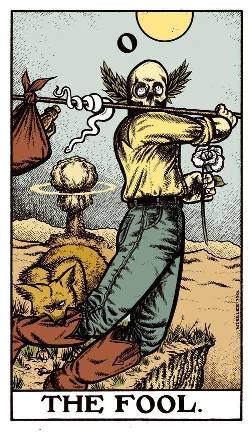 Trinity deals with the death of God (or gods) and tells the story of a fool’s hellish journey through the blood-soaked deserts of the American Southwest through religious, occult, and alchemical allusions. Trinity has several references. It refers to the atomic test site in New Mexico, the biblical meaning of trinity of the Father, the Son and the Holy Spirit, the third album that concludes the trilogy and the fact that Zebulon Whatley grew up near the Trinity River in East Texas among other things. The album is a epic song-cycle that tells a quite terrible story over 16 songs. On the album the arrangements, orchestration and production are clearly more developed than on the previous albums. The music consists of several layers of instruments, more choir, strings, effects, and echo than on previous albums. It’s still minimalistic. With its 72 minutes, it is a powerful experience. I mentioned above that the sound of Sons of Perdition is very restrained. On the track "Zero Point", however, Zebulon Whatley gradually cranks up the mood and then gives all the he got (and that’s a lot) in a splendid crescendo. The album ends with the very beautiful "Ascension" - a worthy conclusion. The sound quality is brilliant. Zebulon Whatley writes in his liner notes "So concludes the Dissolution Trilogy. It is finished." If you pre-ordered the album a tarot card was included ("The Fool" by Christoph Mueller). You can read an in-depth article here (opens in a new window). An album with demos and unreleased songs was released digitally in March 2014. "The Dissolution Orphans" isn't an album in its own right. It's a history and a chance for the listener to trepan the skull of Zebulon Whatley and peer at the worms writhing within. This is a notebook, bound in flesh and penned in blood. The quality of the recordings varies greatly since they were never intended for public consumption. There are audio issues with some of the oldest recordings. Consider these hisses and pops the punctuation in this hellish volume. With the exception of Simon Broke's double bass on "The Shadow of the Undertaker", everything on the album is written and performed by Zebulon Whatley.” You can read my review of the album here (opens in a new window).
Trinity deals with the death of God (or gods) and tells the story of a fool’s hellish journey through the blood-soaked deserts of the American Southwest through religious, occult, and alchemical allusions. Trinity has several references. It refers to the atomic test site in New Mexico, the biblical meaning of trinity of the Father, the Son and the Holy Spirit, the third album that concludes the trilogy and the fact that Zebulon Whatley grew up near the Trinity River in East Texas among other things. The album is a epic song-cycle that tells a quite terrible story over 16 songs. On the album the arrangements, orchestration and production are clearly more developed than on the previous albums. The music consists of several layers of instruments, more choir, strings, effects, and echo than on previous albums. It’s still minimalistic. With its 72 minutes, it is a powerful experience. I mentioned above that the sound of Sons of Perdition is very restrained. On the track "Zero Point", however, Zebulon Whatley gradually cranks up the mood and then gives all the he got (and that’s a lot) in a splendid crescendo. The album ends with the very beautiful "Ascension" - a worthy conclusion. The sound quality is brilliant. Zebulon Whatley writes in his liner notes "So concludes the Dissolution Trilogy. It is finished." If you pre-ordered the album a tarot card was included ("The Fool" by Christoph Mueller). You can read an in-depth article here (opens in a new window). An album with demos and unreleased songs was released digitally in March 2014. "The Dissolution Orphans" isn't an album in its own right. It's a history and a chance for the listener to trepan the skull of Zebulon Whatley and peer at the worms writhing within. This is a notebook, bound in flesh and penned in blood. The quality of the recordings varies greatly since they were never intended for public consumption. There are audio issues with some of the oldest recordings. Consider these hisses and pops the punctuation in this hellish volume. With the exception of Simon Broke's double bass on "The Shadow of the Undertaker", everything on the album is written and performed by Zebulon Whatley.” You can read my review of the album here (opens in a new window).
 After the completion of the Dissolution trilogy, Sons of Perdition have expanded into a four-piece and later five-piece band and the back to three-pece band again. The frontfigure Zebulon Whatley has declared that he seeks new challenges in his songwriting. The songs on the split album ”Fossils” are the first within the new parameters. According to themselves the new Sons of Perdition marks a departure from their previous work both aesthetically and thematically. I asked Zebulon Whatley about the musical direction, sound, lyrical themes and any forthcoming album. He replied: It's different. The lyrics are more abstract, the vocals a bit more naturalistic. I think the whole thing sounds looser than the previous albums. The addition of drums is a big change. It took me a bit to get used to drums in the context of my songs, but they’re definitely better for it. And I’m excited to be working with the band. They’re great people and phenomenal musicians. That higher level of musicianship definitely shows up in the recordings. As for the theme, my songs are about the traces that people leave in their absence.” In my opinion, Sons of Perdition has evolved in this direction. The aforementioned departure from their previous work doesn't consist of any sharp turn musically. It's just a natural progression from "Trinity”. The change in musical style could be dimly seen already then. The differences are greater when it comes to the lyrical content. Zebulon Whatley is bored with religious topics and also felt he has exhausted the subject. The lyrics are still dark, but not as pitch-black or macabre as before. I'm pleasantly surprised by the new Sons of Perdition and the album. You can read my review of the "Fossils" album here (opens in a new window), and "Gathered Blood" here (opens in a new window) and "Heathen Hof" here (opens in a new window). The latter album was scheduled as follows: "It will be released when it’s done." It should be obvious from this article that Sons of Perdition is one of my absolute favorites.
After the completion of the Dissolution trilogy, Sons of Perdition have expanded into a four-piece and later five-piece band and the back to three-pece band again. The frontfigure Zebulon Whatley has declared that he seeks new challenges in his songwriting. The songs on the split album ”Fossils” are the first within the new parameters. According to themselves the new Sons of Perdition marks a departure from their previous work both aesthetically and thematically. I asked Zebulon Whatley about the musical direction, sound, lyrical themes and any forthcoming album. He replied: It's different. The lyrics are more abstract, the vocals a bit more naturalistic. I think the whole thing sounds looser than the previous albums. The addition of drums is a big change. It took me a bit to get used to drums in the context of my songs, but they’re definitely better for it. And I’m excited to be working with the band. They’re great people and phenomenal musicians. That higher level of musicianship definitely shows up in the recordings. As for the theme, my songs are about the traces that people leave in their absence.” In my opinion, Sons of Perdition has evolved in this direction. The aforementioned departure from their previous work doesn't consist of any sharp turn musically. It's just a natural progression from "Trinity”. The change in musical style could be dimly seen already then. The differences are greater when it comes to the lyrical content. Zebulon Whatley is bored with religious topics and also felt he has exhausted the subject. The lyrics are still dark, but not as pitch-black or macabre as before. I'm pleasantly surprised by the new Sons of Perdition and the album. You can read my review of the "Fossils" album here (opens in a new window), and "Gathered Blood" here (opens in a new window) and "Heathen Hof" here (opens in a new window). The latter album was scheduled as follows: "It will be released when it’s done." It should be obvious from this article that Sons of Perdition is one of my absolute favorites.
The cover art are stylish. On the cover of the first album, TKIOF: a family in front of their shed-like home somewhere in the backwoods (according to unconfirmed information on the Internet the shed nowadays actually have a working internet connection). On the second album, PFTSD: Well, what can I say more than that the cover art fits the music perfectly. The cover was created by the artist, illustrator, cartoonist and letterer Christoph Mueller. On the third album, Trinity: the cover art was created by Zebulon Whatley. The artwork for The Dissolution Orphans is from a photo Zebulon Whatley took in eastern New Mexico while searching for ghost towns. On the cover of the split album with Jaran Hereid: skeleton in a nice frame. The photo was taken by either Zebulon Whatley or bassist Simon Broke (it's not clear who held the camera at the time) on a roadtrip through southwest of United States.
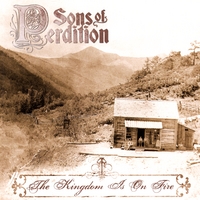 |
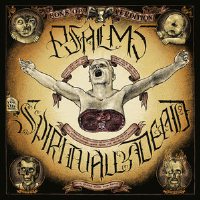 |
 |
 |
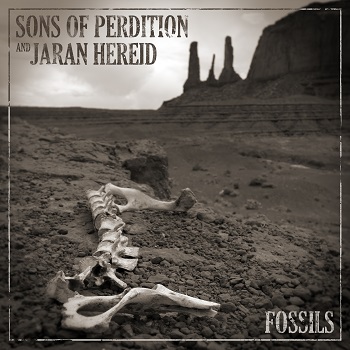 |
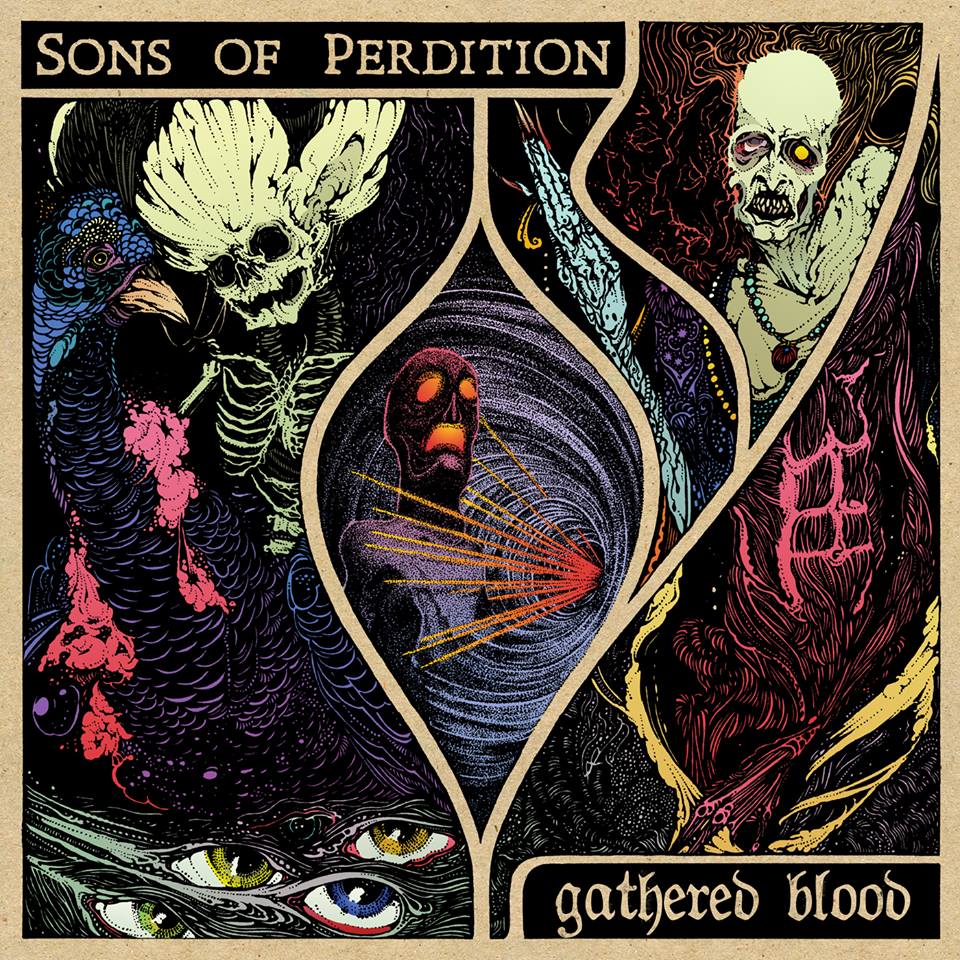 |
 |
Sons of Perdition has contributed with a song (Psalm of Nod) on one of the four compilations (Rodentia I) in the series of "The Best Of Dark Roots" from the now defunct record company Devils Ruin Records in Indiana. That in itself is a mark of quality. The song "Anhelo" is also representend on "Yells From The Crypt", a weird compilation from Gravewax Records. The songs “Paying My Debts" and "In The Air Tonight" (yes, the Phil Collins cover!) are represented on “The Death Roots Syndicate", vol. 2 and vol. 3 respectively. Below is a suggestion for a 2-CD compilation.
|
No |
Song |
Album |
|
1 |
This Land Is Cursed |
The Kingdom Is On Fire |
|
2 |
Anhelo |
The Kingdom Is On Fire |
|
3 |
Blood In The Valley |
The Kingdom Is On Fire |
|
4 |
Fall To Your Knees |
The Kingdom Is On Fire |
|
5 |
Psalm Of Withering |
Psalms For The Spiritually Dead |
|
6 |
Psalm Of Sand Creek |
Psalms For The Spiritually Dead |
|
7 |
Psalm Of Nod |
Psalms For The Spiritually Dead |
|
8 |
Psalm Of Solitude |
Psalms For The Spiritually Dead |
|
9 |
Psalm Of Woe |
Psalms For The Spiritually Dead |
|
10 |
Psalm Of Warmth |
Psalms For The Spiritually Dead |
|
11 |
Psalm Of Slumber |
Psalms For The Spiritually Dead |
|
12 |
Fallout |
Trinity |
|
13 |
Exile |
Trinity |
|
14 |
Paying My Debts |
Trinity |
|
15 |
The Trickster |
Trinity |
|
16 |
Song Of Ruin |
Trinity |
|
17 |
Profane The Night |
Trinity |
|
18 |
Zero Point |
Trinity |
|
19 |
Ascension |
Trinity |
|
20 |
The Broadsword |
Gathered Blood |
|
21 |
No Escape From Dreamland |
Gathered Blood |
|
22 |
Kannibalen Von Rothenburg |
Gathered Blood |
|
23 |
Lost In The Inner Havens |
Gathered Blood |
|
24 |
O Lay Me Not In The Consecrated Ground |
Heathen Hof |
|
25 |
Cold Blood Congealing in a Dead Sparrow's Heart |
Heathen Hof |
|
26 |
In the Garden |
Heathen Hof |
|
27 |
The Flagellant |
Heathen Hof |
|
28 |
Götterdämmerung |
Heathen Hof |
Best album: Trinity
Best songs: This Land Is Cursed, Anhelo, Blood In The Valley, Fall To Your Knees, Psalm Of Withering, Psalm Of Nod, Psalm Of Woe, Paying My Debts, The Trickster, Song of Ruin, Profane The Night, Zero Point, Lost In The Inner Havens, O Lay Me Not In The Consecrated Ground, Götterdämmerung
